专题11 易混动词(短语)辨析(一)2023中考英语三轮-重难点突破刷题(含解析)
文档属性
| 名称 | 专题11 易混动词(短语)辨析(一)2023中考英语三轮-重难点突破刷题(含解析) |
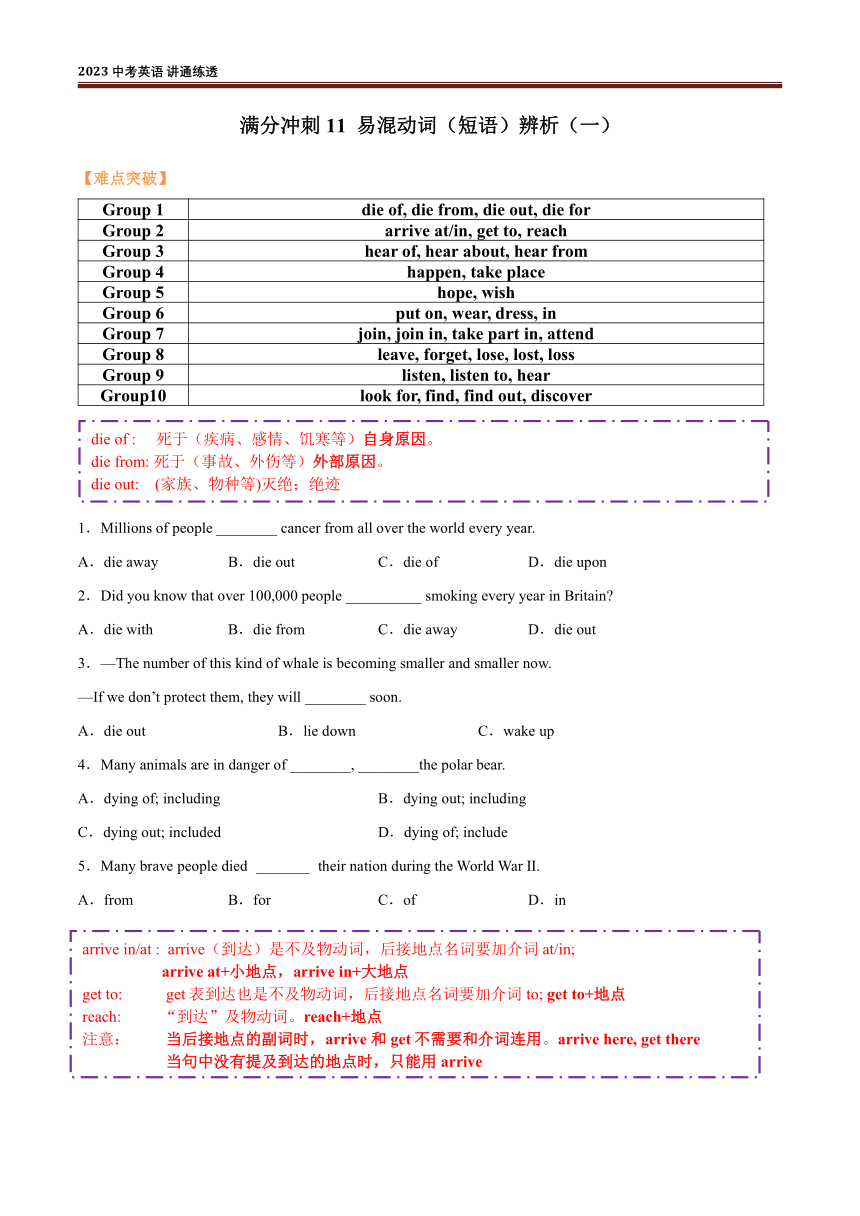
|
|
| 格式 | docx | ||
| 文件大小 | 229.8KB | ||
| 资源类型 | 教案 | ||
| 版本资源 | 人教新目标(Go for it)版 | ||
| 科目 | 英语 | ||
| 更新时间 | 2023-05-12 07:36:30 | ||
图片预览

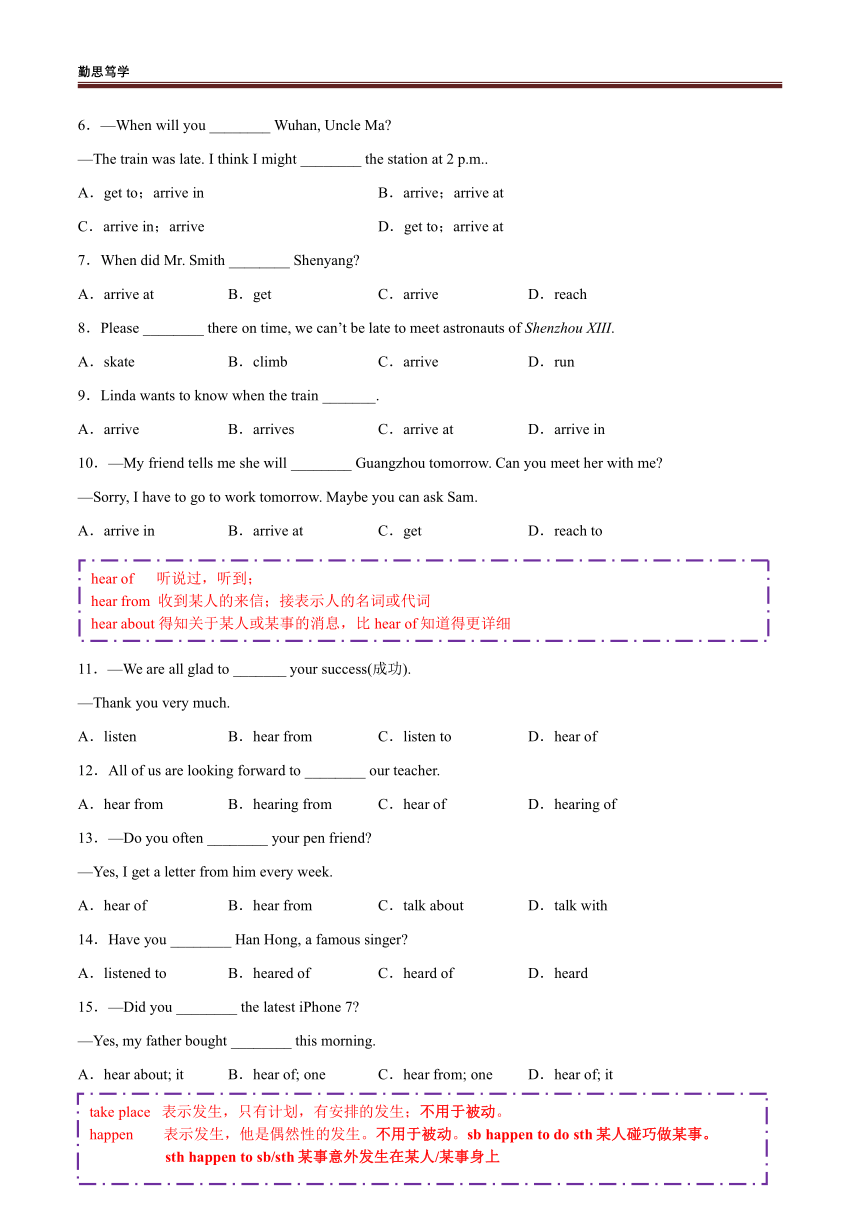
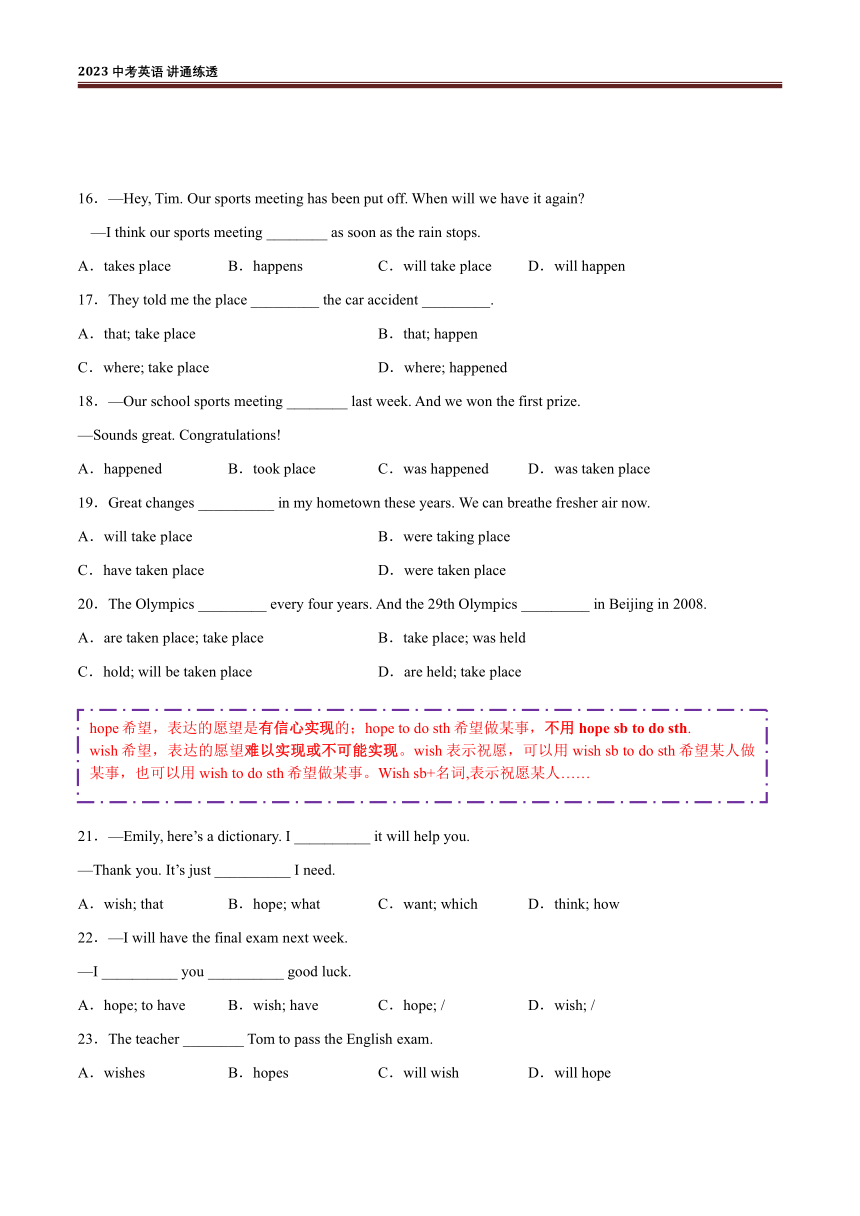
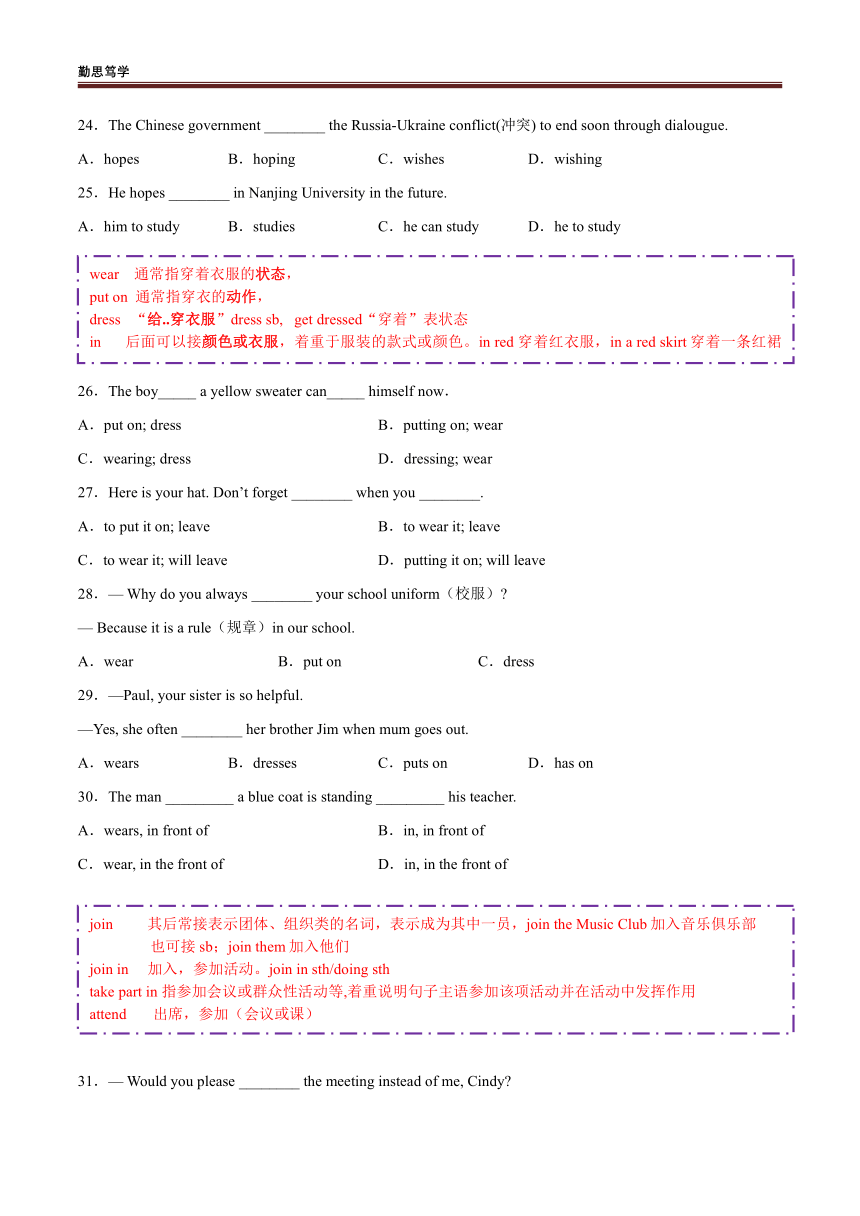
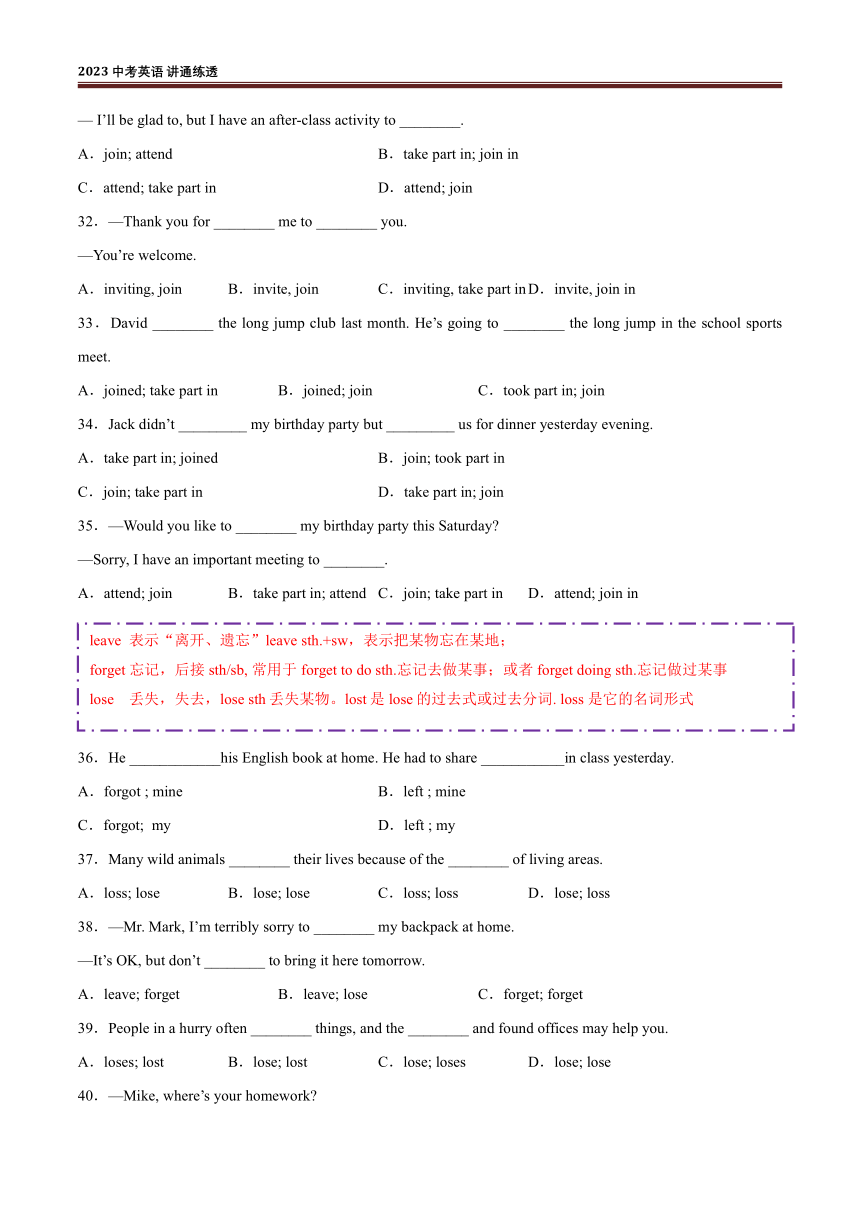
文档简介
勤思笃学
2023 中考英语 讲通练透
满分冲刺11 易混动词(短语)辨析(一)
【难点突破】
Group 1 die of, die from, die out, die for
Group 2 arrive at/in, get to, reach
Group 3 hear of, hear about, hear from
Group 4 happen, take place
Group 5 hope, wish
Group 6 put on, wear, dress, in
Group 7 join, join in, take part in, attend
Group 8 leave, forget, lose, lost, loss
Group 9 listen, listen to, hear
Group10 look for, find, find out, discover
(
die of :
死于(疾病、感情、饥寒等)
自身原因
。
d
ie from:
死于(事故、外伤等)
外部原因
。
die out:
(
家族、物种等
)
灭绝;绝迹
)
1.Millions of people ________ cancer from all over the world every year.
A.die away B.die out C.die of D.die upon
2.Did you know that over 100,000 people __________ smoking every year in Britain
A.die with B.die from C.die away D.die out
3.—The number of this kind of whale is becoming smaller and smaller now.
—If we don’t protect them, they will ________ soon.
A.die out B.lie down C.wake up
4.Many animals are in danger of ________, ________the polar bear.
A.dying of; including B.dying out; including
C.dying out; included D.dying of; include
5.Many brave people died _______ their nation during the World War II.
A.from B.for C.of D.in
(
arrive in/at
:
a
rrive
(到达)是不及物动词,后接地点名词要加介词
a
t/in;
arrive at+
小地点,
a
rrive in+
大地点
g
et to: get
表到达也是不及物动词,后接地点名词要加介词
t
o;
get to+
地点
reach:
“到达”及物动词。
r
each+
地点
注意:
当后接地点的副词时,
a
rrive
和
g
et
不需要和介词连用
。
arrive here, get there
当句中没有提及到达的地点时,只能用
a
rrive
)
6.—When will you ________ Wuhan, Uncle Ma
—The train was late. I think I might ________ the station at 2 p.m..
A.get to;arrive in B.arrive;arrive at
C.arrive in;arrive D.get to;arrive at
7.When did Mr. Smith ________ Shenyang
A.arrive at B.get C.arrive D.reach
8.Please ________ there on time, we can’t be late to meet astronauts of Shenzhou XIII.
A.skate B.climb C.arrive D.run
9.Linda wants to know when the train _______.
A.arrive B.arrives C.arrive at D.arrive in
10.—My friend tells me she will ________ Guangzhou tomorrow. Can you meet her with me
—Sorry, I have to go to work tomorrow. Maybe you can ask Sam.
A.arrive in B.arrive at C.get D.reach to
(
hear of
听说过,听到
;
hear from
收到某人的来信;
接表示人的名词或代词
hear about
得知
关于某人或某事的消息,比
h
ear of
知道
得更详细
)
11.—We are all glad to _______ your success(成功).
—Thank you very much.
A.listen B.hear from C.listen to D.hear of
12.All of us are looking forward to ________ our teacher.
A.hear from B.hearing from C.hear of D.hearing of
13.—Do you often ________ your pen friend
—Yes, I get a letter from him every week.
A.hear of B.hear from C.talk about D.talk with
14.Have you ________ Han Hong, a famous singer
A.listened to B.heared of C.heard of D.heard
15.—Did you ________ the latest iPhone 7
—Yes, my father bought ________ this morning.
A.hear about; it B.hear of; one C.hear from; one D.hear of; it
(
take place
表示发生,只有计划,有安排的发生;
不用于被动
。
happen
表示发生,他是偶然性的发生
。
不用于被动
。
s
b happen to do sth
某人碰巧做某事。
s
th happen to sb/sth
某事意外发生在某人
/
某事身上
)
16.—Hey, Tim. Our sports meeting has been put off. When will we have it again
—I think our sports meeting ________ as soon as the rain stops.
A.takes place B.happens C.will take place D.will happen
17.They told me the place _________ the car accident _________.
A.that; take place B.that; happen
C.where; take place D.where; happened
18.—Our school sports meeting ________ last week. And we won the first prize.
—Sounds great. Congratulations!
A.happened B.took place C.was happened D.was taken place
19.Great changes __________ in my hometown these years. We can breathe fresher air now.
A.will take place B.were taking place
C.have taken place D.were taken place
20.The Olympics _________ every four years. And the 29th Olympics _________ in Beijing in 2008.
A.are taken place; take place B.take place; was held
C.hold; will be taken place D.are held; take place
(
hope
希望,表达的愿望是
有信心实现
的;
hope to do sth
希望做某事
,
不用
hope sb to do sth
.
wish
希望,表达的愿望
难
以
实现或不可能实现
。
wish
表示祝愿,可以用
wish sb to do sth
希望某人做某事,也可以用
wish to do sth
希望做某事
。
Wish
sb+
名词
,
表示祝愿某人
……
)
21.—Emily, here’s a dictionary. I __________ it will help you.
—Thank you. It’s just __________ I need.
A.wish; that B.hope; what C.want; which D.think; how
22.—I will have the final exam next week.
—I __________ you __________ good luck.
A.hope; to have B.wish; have C.hope; / D.wish; /
23.The teacher ________ Tom to pass the English exam.
A.wishes B.hopes C.will wish D.will hope
24.The Chinese government ________ the Russia-Ukraine conflict(冲突) to end soon through dialougue.
A.hopes B.hoping C.wishes D.wishing
25.He hopes ________ in Nanjing University in the future.
A.him to study B.studies C.he can study D.he to study
(
wear
通常指穿着
衣服的
状态
,
put on
通常指穿衣的
动作
,
dress
“
给
.
.
穿衣服
”
d
ress sb
,
get dressed
“穿着”表状态
in
后面可以接
颜色
或衣服
,着重于服装的款式或颜色。
i
n red
穿着红衣服,
i
n a red skirt
穿着一条红裙子
)
26.The boy_____ a yellow sweater can_____ himself now.
A.put on; dress B.putting on; wear
C.wearing; dress D.dressing; wear
27.Here is your hat. Don’t forget ________ when you ________.
A.to put it on; leave B.to wear it; leave
C.to wear it; will leave D.putting it on; will leave
28.— Why do you always ________ your school uniform(校服)
— Because it is a rule(规章)in our school.
A.wear B.put on C.dress
29.—Paul, your sister is so helpful.
—Yes, she often ________ her brother Jim when mum goes out.
A.wears B.dresses C.puts on D.has on
30.The man _________ a blue coat is standing _________ his teacher.
A.wears, in front of B.in, in front of
C.wear, in the front of D.in, in the front of
(
join
其后常接表示团体、组织类的名词
,表示成为其中一员
,
j
oin the Music Club
加入音乐俱乐部
也可接
sb
;
join them
加入他们
join in
加入,
参加
活动
。
j
oin in sth/doing sth
take part in
指参加会议或群众性活动等
,
着重说明句子主语参加该项活动并在活动中发挥作用
attend
出席,参加(会议或课)
)
31.— Would you please ________ the meeting instead of me, Cindy
— I’ll be glad to, but I have an after-class activity to ________.
A.join; attend B.take part in; join in
C.attend; take part in D.attend; join
32.—Thank you for ________ me to ________ you.
—You’re welcome.
A.inviting, join B.invite, join C.inviting, take part in D.invite, join in
33.David ________ the long jump club last month. He’s going to ________ the long jump in the school sports meet.
A.joined; take part in B.joined; join C.took part in; join
34.Jack didn’t _________ my birthday party but _________ us for dinner yesterday evening.
A.take part in; joined B.join; took part in
C.join; take part in D.take part in; join
35.—Would you like to ________ my birthday party this Saturday
—Sorry, I have an important meeting to ________.
A.attend; join B.take part in; attend C.join; take part in D.attend; join in
(
leave
表示“离开、遗忘”
leave sth.+
sw
,表示把某物忘在某地;
forget
忘记,
后接
s
th/sb,
常用于
forget to do sth.
忘记去做某事;或者
forget doing sth.
忘记做过某事
l
ose
丢失,失去,
l
ose sth
丢失某物。
lost
是
lose
的过去式或过去分词
.
loss
是它的名词形式
)
36.He ____________his English book at home. He had to share ___________in class yesterday.
A.forgot ; mine B.left ; mine
C.forgot; my D.left ; my
37.Many wild animals ________ their lives because of the ________ of living areas.
A.loss; lose B.lose; lose C.loss; loss D.lose; loss
38.—Mr. Mark, I’m terribly sorry to ________ my backpack at home.
—It’s OK, but don’t ________ to bring it here tomorrow.
A.leave; forget B.leave; lose C.forget; forget
39.People in a hurry often ________ things, and the ________ and found offices may help you.
A.loses; lost B.lose; lost C.lose; loses D.lose; lose
40.—Mike, where’s your homework
—Sorry, Mr. Hu. I ________ it at home and forget ________ it to school.
A.lose; to bring B.leave; bringing
C.leave; to bring D.lose; bringing
(
hear
听见,听到。其后直接跟宾语,
强调的是听的结果
,
listen
“
听
”
强调的是听的动作,
不及物动词。
接宾语时,常与
to
连用
)
41.________! Can you ________ a whisper
A.Listen; hear B.Listen to; hear C.Listen; hear to D.Hear; listen to
42.Don’t ________ music in class.
A.listen B.listen to C.to listen to
43.Don’t ________ music in class. You can do it after class.
A.listening to B.listen C.listen to D.hear
44.Can you speak loudly I can’t ________ you well.
A.hear B.sound C.listen
45.________! Can you ________ anything, Lily
A.Listen; hear B.Listen to; hear C.Listen; hear to D.Hear; listen to
(
find
找到,强调找的结果;
f
ind
还表示“发
现”,
f
ind sb do/doing sth
发现某人做了
/
正在做某事
find it adj. to do sth
发现做某事是
…
的
look for
寻找,强调找的过程
find out
表示找出,发现,查明
(
真相等
)
,
指通过调查、寻问、打听、研究之后
“
搞清楚、弄明白
”,
通常含有
“
经过困难曲折
”
的含义
,
指找出较难找到的、无形的、抽象的东西。
d
iscover
发现,指发现原来存在而未被发现的东西
)
46.My sister is ________ her bag, but she can’t ________ it.
A.finding; find B.looking for; look for
C.finding; look for D.looking for; find
47.—I’ll get to Wuhan tonight. Can you________me a hotel
— Sure!
A.find B.take C.look D.help
48.—What is Kate doing over there
—She ________ her pen, but she can’t ________ it.
A.is finding, look for B.looks for, find C.is looking for, find
49.I ________ my pen everywhere, but I couldn’t ________ it. I want to ________ who took it.
A.looked for; find out; find B.looked for; find; find out
C.found; find out; look for D.found out; look for; find
50.Marie Curie __________ radium and won the Nobel Prize for Physics in 1903.
A.found B.discovered C.explored D.invented
参考答案:
1.C
【详解】句意:全世界每年有数百万人死于癌症。
考查动词短语。die away逐渐消失;die out灭绝;die of死于(疾病、过度悲伤等);die upon死在。根据“Millions of people …cancer”可知,此处空后为疾病,使用die of。故选C。
2.B
【详解】句意:你知道英国每年有超过10万人死于吸烟吗?
考查动词短语辨析。die with“随着……而消失”;die from“死于”;die away“消失”;die out“灭绝”。根据“over 100,000 people … smoking”可知,此处指死于吸烟,故选B。
3.A
【详解】句意:——这种鲸鱼的数量现在变得越来越少了。——如果我们不保护它们,它们很快就会灭绝。
考查动词短语。die out灭绝;lie down躺下;wake up醒来。根据“The number of this kind of whale is becoming smaller and smaller now”可知,如果不保护正在灭绝的鲸鱼,它们就会灭绝,故选A。
4.B
【详解】句意:许多动物都处于灭绝的危险之中,包括北极熊。
考查动词短语及现在分词的用法。dying of死于……;dying out灭绝。第一空后没有宾语,结合“in danger of”可知应用“dying out”,表示面临灭绝的危险,排除选项A和D。“Many animals”与“include”是逻辑上的主动关系,因此第二空应用现在分词“including”,作补足语。故选B。
5.B
【详解】句意:在第二次世界大战中,许多勇敢的人为祖国牺牲了。
考查介词辨析。die from死于;die for因……而牺牲;die of死于;die in死在某地。根据“their nation”可知,为祖国而牺牲,故选B。
6.D
【详解】句意:——马叔叔,你什么时候到武汉?——火车晚点了。我想我可能下午2点到达车站。
考查动词短语辨析。get to到达;arrive in到达,后接大地点;arrive at到达,后接小地点;arrive到达,不及物动词,不能直接接宾语。第一空后是大地点,应用get to/arrive in,排除B选项;第二空后是小地点,应用get to/arrive at,故选D。
7.D
【详解】句意:史密斯先生什么时候到达沈阳?
考查动词辨析。arrive at到达(小地点);get到达,不及物动词;arrive到达,不及物动词;reach到达,及物动词。空格后是直接加宾语,排除BC,且沈阳是大地点,不用介词at,排除A。故选D。
8.C
【详解】句意:请准时到达那里,我们那天不能迟到。
考查动词辨析。skate滑冰;climb攀爬;arrive到达;run跑。根据下文“we can’t be late to meet astronauts of Shenzhou XIII”可知,我们要准时到达那里。故选C。
9.B
【详解】句意:Linda想知道火车什么时候到达。
考查动词的用法。arrive是不及物动词,后面跟宾语的时候,需要加介词in或者at;后面不跟宾语的时候,则不需要加介词。分析题干可知,空后没有具体的宾语,排除C、D两项,结合wants可知,从句也用一般现在时,主语the train提示谓语动词用第三人称单数形式。故选B。
10.A
【详解】句意:——我的朋友告诉我她明天将到达广州。你能和我一起见她吗?——对不起,我明天要去上班。也许你可以问问萨姆。
考查动词辨析。arrive,get和reach都可以表示“到达”。arrive是不及物动词,后常跟介词in或at,arrive in +大地点,arrive at + 小地点;get 是不及物动词,后跟地点名词时,要用get to;reach是及物动词,其后可以直接跟地点名词。故选A。
11.D
【详解】句意:——我们听说你的成功很高兴。——非常感谢你。
考查动词短语。listen听,不及物动词;hear from收到……来信;listen to听;hear of听说。根据“your success”可知,这里指听说你的成功,故选D。
12.B
【详解】句意:我们大家都盼望着老师的来信。
考查动词短语的辨析。hear from收到……来信;hear of听说。根据空前的“All of us are looking forward to”及其空后的“our teacher”可知,“我们”大家都盼望着老师的来信。另外,look forward to doing sth. 意为“盼望做某事”。故选B。
13.B
【详解】句意:——你经常收到你笔友的来信吗?——是的,我每星期收到他的一封来信。
考查动词短语辨析。hear of听说;hear from收到……的来信;talk about谈论关于……;talk with和……谈。根据答语“I get a letter from him every week.”可知我每星期收到他的一封来信,所以可推测问句应用hear from“收到……的信”。故选B。
14.C
【详解】句意:你听说过著名歌手韩红吗?
考查动词及动词短语。listened to听,指听的过程、动作;heared of表述错误,hear的过去分词是heard;heard of听说,hear of sb.“听说某人”;heard听见,指听的结果。本题指听说过歌手韩红吗,应用heard of。故选C。
15.B
【详解】句意:——你听说最新的iPhone 7吗?——是的,我爸爸今天早上买了一个。
考查动词短语以及代词。hear about听说;hear of听说;hear from收到……的来信;one一个(同类不同物);it它(同类同物)。根据“Did you...the latest iPhone 7”可知此处表示“听说”,排除C;而第二个空表示“一个”,是上文的iPhone 7同类不同物,用one,排除AD。故选B。
16.C
【详解】句意:——嘿,蒂姆。我们的运动会延期了,我们什么时候再举行?——我想我们的运动会将在雨停后举行。结合语境理解可知,运动会还没有举行,要用一般将来时态来表达,首先排除A,B;happen / take place它们都可以表示“发生”,但是在用法上有区别,happen常指具体事件的发生,特别指偶然的或未能预见的事情;如要指事先安排或有准备的事情或活动发生时,通常要用take place,另外take place还有“举行”的意思。结合句意,故答案为C。
17.D
【详解】考查定语从句与动词。句意:他们告诉我发生事故的地方。The place 是先行词,where引导一个定语从句,take place 表示“发生、举行、举办”,一般指非偶然性事件的“发生”,即这种事件的发生一定有某种原因或事先的安排,例如: Great changes have taken place in our hometown during the past ten years. happen作“发生、碰巧”解,一般用于偶然或突发性事件,例如 Maybe something unexpected happened. 故选D项。
18.B
【详解】句意:——我们学校的运动会上周举行了。我们赢得了一等奖。——听起来不错。祝贺!
考查动词辨析和语态。happened(偶然地)发生;出现;took place (有计划地)发生。两者都没有被动形式。运动会应该是有计划地发生,故选B。
19.C
【详解】句意:这些年来,我的家乡发生了巨大的变化。我们现在可以呼吸更新鲜的空气。
考查动词时态和语态。take place“发生”是不及物动词短语,没有被动语态,排除D;根据“these years”可知,过去直到现在这段时间里发生的变化应该使用现在完成时,结构是have done。故选C。
20.B
【详解】试题分析:句意:奥林匹克运动会每四年举行一次。第29届奥林匹克运动会在2008年在北京举行的。被动语态表示主语是动作的承受者,即行为动作的对象。被动语态由“助动词be+及物动词的过去分词”构成。take place发生,没有被动语态。结合句意,故选B
考点:考查动词时态及语态。
21.B
【详解】句意:——艾米丽,这有本字典。我希望这对你有帮助。——谢谢。这正是我所需要的。
考查动词辨析和宾语从句。wish希望;hope希望;want想要;think认为。分析第二处,此处是宾语从句,引导词在从句中作宾语,排除AD;want不直接加从句,故选B。
22.D
【详解】句意:——下周我要期末考试。——祝你好运。
考查动词辨析。hope希望,后加动词不定式作宾语,或宾语从句,且不可用结构hope sb. to do sth.,排除AC;wish希望,wish sb. to do sth.“希望某人做某事”,排除B;wish sb. good luck“祝某人好运”,固定用法。故选D。
23.A
【详解】句意:老师希望Tom通过英语考试。
考查动词辨析及时态。根据“Tom to pass the English exam.”可知,此处是固定用法wish sb. to do sth. 意为“希望某人做某事,没有hope sb. to do sth. 这一结构,且根据语境知应用一般现在时。此空应填wishes,故选A。
24.C
【详解】句意:中国政府希望俄乌冲突通过对话尽快结束。
考查动词辨析。hopes希望,动词三单;hoping动名词;wishes希望,动词三单;wishing动名词。首先根据“the Russia-Ukraine conflict(冲突) to end...”可知此处是wish sb to do sth“希望某人做某事”的结构,而hope无此用法,排除AB选项;此空是作谓语动词,所以应用wishes,故选C。
25.C
【详解】句意:他希望将来能在南京大学学习。
考查动词hope的用法。hope的用法:hope to do sth或接宾语从句,不能接sb to do sth,四个选项中只有C选项结构正确,故选C。
26.C
【详解】试题分析:句意为:穿着黄色毛衣的那个男孩现在可以自己穿衣服了。put on、dress、wear均可表示“穿着”, put on强调的是动作,dress和wear既可表示动作,也可表示状态。根据语境,“穿着黄色毛衣”表示状态;此外,dress oneself表示自己穿衣服。结合选项可知应选C。
考点:考查非谓语动词及动词。
27.A
【详解】句意:这是你的帽子。离开时别忘了戴上它。
考查非谓语及时态。forget to do sth“忘记去做某事”,forget doing sth“忘记做过某事”,结合语境可知,第一空表示不要忘记去做,应用不定式形式,排除D选项;第二句是when引导的时间状语从句,应用一般现在时代替一般将来时,排除C选项;而wear表示“穿”的状态,put on表示“穿”的动作,第一空强调动作,应用put on,故选A。
28.A
【详解】句意:——你为什么总是穿你的校服?——因为这是我们学校的规定。
考查动词辨析。wear穿,表示穿的状态,后接衣服;put on穿上,表示穿的动作,后接衣服;dress给……穿衣服,既指穿的状态也指穿的动作,后接人。分析句子可知,你为什么总是穿着校服,在这里表示穿的状态,宾语为school uniform校服,指衣服,wear符合题意。故选A。
29.B
【详解】句意:——保罗,你姐姐真是乐于助人。——是的,妈妈外出时,她经常给她弟弟吉姆穿衣服。
考查动词辨析。wears穿,表示穿的状态;dresses穿,后面加人,表示给某人穿衣服;puts on穿上,表示穿的动作;has on表示穿着。根据空后的“ her brother”可知,此处表示给某人穿衣服,故选B。
30.B
【详解】句意:那个穿蓝色外套的人正站在他的老师面前。
考查介词和介词短语。wear穿,强调状态;in穿着。本句已有谓语动词“is standing”,所以用in表示“穿着”,排除AC。in front of在……的前面(外部);in the front of在……的前面(内部)。根据“his teacher”可知,是两个个体,用in front of。故选B。
31.C
【详解】句意:——辛迪,你能代替我去参加会议吗?——我很乐意,但是我有一个课后活动要参加。
考查动词辨析。attend参加,出席;take part in参加(活动);join参加(组织);join in参加(活动)。根据“the meeting”可知,出席会议,attend符合句意;再者根据“have an after-class activity”可知,参加活动,take part in符合句意,故选C。
32.A
【详解】句意:谢谢你们邀请我加入你们。——不客气。
考查非谓语动词及词汇辨析。join in参加活动或比赛;join加入组织或团体成为其中一员;take part in参加活动、比赛等团体性活动。Thank you for doing sth.“感谢你(们)做某事”,第一空用动名词,排除BD;再由“you”可知用join sb.表示“加入某人”。故选A。
33.A
【详解】句意:大卫上个月参加了跳远俱乐部。他将参加学校运动会的跳远比赛。
考查动词和动词短语辨析。join“加入”,指加入某个团体、组织,成为其中的一员;take part in“参加”,指参加比赛、竞赛等活动。根据“the long jump club”可知,第一空应用join;再根据“the long jump in the school sports meet”可知,第二空指参加学校运动会的跳远比赛,应用take part in。故选A。
34.A
【详解】句意:杰克没有参加我的生日聚会,但昨天晚上和我们一起吃晚餐。
考查动词短语辨析。take part in参加某个活动;join加入某个组织、机构等。第一个空后的my birthday party是生日聚会,因此用take part in,排除B/C;第二个空后是us for dinner,这里是加入我们,此题的时态为一般过去时,因此用joined。故选A。
35.B
【详解】句意:——这个星期六你愿意参加我的生日聚会吗?——对不起,我有一个重要的会议要参加。
考查词义辨析。attend出席,参加(会议或课);join加入(组织或团体);take part in参加(群众性活动);join in加入,参加(活动)。由空格后“my birthday party”可知是参加生日派对,表达参加活动,第一个空格处用动词短语take part in或join in, 根据“an important meeting”可知表达出席会议,第二个空格处用动词attend。故选B。
36.B
【详解】试题分析:句意:他把他的书落在了家里。昨天他不得不在课上和我一起分享我的。此题考查固定短语leave sth+介词短语表示把某物落在了什么地方。根据句意,应选B。
考点:考查动词和代词。
37.D
【详解】句意:许多野生动物因为失去了生存区而失去了生命。
考查动词和名词用法。lose失去,是动词;loss丧失,是名词。第一空需要作谓语,应用动词lose;第二空被冠词the修饰,应用名词loss,故选D。
38.A
【详解】句意:——马克先生,非常抱歉我把背包落在家里了。——没关系,不过别忘了明天带来。
考查动词辨析。leave把某人或某物留在某处;forget忘记;lose失去。根据“I’m terribly sorry to...my backpack at home.”可知,此处指把背包落在家里,用leave;根据“don’t...to bring it here tomorrow.”可知,此处马克先生提醒“我”要带背包,即“别忘记明天把背包带来”,用forget。故选A。
39.B
【详解】句意:匆忙中的人往往会丢失东西,而失物招领处可能会帮助你。
考查动词辨析。loses第三人称单数形式;lose动词原形;lost动词过去式。根据“People in a hurry”着急的人,及选项可知是着急的人容易丢东西,时态一般现在时,主语“People”为复数,用lose;后面提到“may help you”(可能会帮助你),因为丢了东西,所以能帮助自己的是失物招领处,固定搭配lost and found“失物招领处”。故选B。
40.C
【详解】句意:——Mike,你的家庭作业在哪里? ——抱歉,胡老师。我把它落在家里,忘记带来学校了。
考查动词辨析及forget的用法。lose丢失;leave离开,留下。leave sth.+地点“把某物落在某地”,而forget to do sth.“忘记去做某事”符合语境,故选C。
41.A
【详解】句意:听!你能听到耳语声吗?
考查动词辨析。listen听,不及物动词,强调动作,若后跟宾语时,则要与介词to连用;hear听到,及物动词,强调结果。第一空强调“听”的动作,没有宾语,所以用不及物动词listen;根据“ Can you... a whisper”可知,第二空强调听的结果,空后有宾语,用及物动词hear,故选A。
42.B
【详解】句意:不要在课上听音乐。
考查祈使句和动词短语。根据“Don’t...music in class.”可知,此空后是名词music,此空应是listen to music表示“听音乐”,且该句为否定式的祈使句,句首是否定助动词Don’t,后接动词原形。故选B。
43.C
【详解】句意:不要在课堂上听过音乐。你可以下课后听。
考查祈使句的否定形式以及动词短语。listen听;hear听见。listen to music“听音乐”,固定搭配,排除B和D选项。此处是祈使句的否定形式,结构为“don’t+动词原形”,故选C。
44.A
【详解】句意:你能大声说话吗?我听不清楚。
考查动词辨析。hear听见,强调结果;sound听起来;listen听,强调动作。根据“Can you speak loudly I can’t...you well.”可知是指听不清,强调听的结果,故选A。
45.A
【详解】句意:听!你有听到什么吗,Lily?
考查动词辨析。listen听(强调动作);listen to听(to后加要听的事物);hear听到(强调听的结果);hear to错误表达。根据“...! Can you...anything, Lily ”可知,第一空表示要让Lily听,强调“听”这个动作,此空应是listen,排除选项B和D;而“Can you...anything, Lily ”则是在询问Lily是否能听到些什么,强调听的结果,所以此空应是hear。故选A。
46.D
【详解】句意:我妹妹正在找她的包,但她找不到。
考查词义辨析。find找到,强调结果;look for寻找,强调动作。第一空强调找包的动作,所以应用动词短语look for。第二空强调结果是没找到,所以第二空填find,故选D。
47.A
【详解】句意:——我今晚就到武汉。你能给我找个旅馆吗?——当然!
考查动词辨析。find寻找;take带;look看;help帮助。根据“I’ll get to Wuhan tonight.”可知,即将到武汉,因此是找一家旅馆,故选A。
48.C
【详解】句意:——凯特在那边做什么?——她正在找她的钢笔,但她找不到它。
考查动词辨析及时态。find找到,强调结果;look for寻找,强调过程。根据“What is Kate doing over there ”可知答句用现在进行时,表示正在寻找钢笔,第一空用is looking for;“不能找到”强调结果,第二空用find。故选C。
49.B
【详解】句意:我到处找我的钢笔,但我找不到。我要查出是谁拿的。
考查动词以及动词短语辨析。look for寻找,强调动作;find寻找,强调结果;find out查明。根据“my pen everywhere”可知,第一空强调找钢笔的动作,所以第一空填looked for;根据“but I couldn’t … it.”可知,第二空强调没有找到的结果,所以第二空填find;根据“I want to … who took it”可知,第三空指想查出谁拿的,故选B。
50.B
【详解】句意:玛丽·居里发现了镭,并于1903年获得诺贝尔物理学奖。
考查动词。found创建,发现;指找寻找到的东西,强调的是结果; discovered发现;发现那些存在,只是未被发现的东西;explored勘探;invented发明,指经过研究、设计而创造出前所未有的动词。结合句意可知,此空是“发现,找到”的意思,应填discovered,故选B。
勤思笃学
2023 中考英语 讲通练透
2023 中考英语 讲通练透
满分冲刺11 易混动词(短语)辨析(一)
【难点突破】
Group 1 die of, die from, die out, die for
Group 2 arrive at/in, get to, reach
Group 3 hear of, hear about, hear from
Group 4 happen, take place
Group 5 hope, wish
Group 6 put on, wear, dress, in
Group 7 join, join in, take part in, attend
Group 8 leave, forget, lose, lost, loss
Group 9 listen, listen to, hear
Group10 look for, find, find out, discover
(
die of :
死于(疾病、感情、饥寒等)
自身原因
。
d
ie from:
死于(事故、外伤等)
外部原因
。
die out:
(
家族、物种等
)
灭绝;绝迹
)
1.Millions of people ________ cancer from all over the world every year.
A.die away B.die out C.die of D.die upon
2.Did you know that over 100,000 people __________ smoking every year in Britain
A.die with B.die from C.die away D.die out
3.—The number of this kind of whale is becoming smaller and smaller now.
—If we don’t protect them, they will ________ soon.
A.die out B.lie down C.wake up
4.Many animals are in danger of ________, ________the polar bear.
A.dying of; including B.dying out; including
C.dying out; included D.dying of; include
5.Many brave people died _______ their nation during the World War II.
A.from B.for C.of D.in
(
arrive in/at
:
a
rrive
(到达)是不及物动词,后接地点名词要加介词
a
t/in;
arrive at+
小地点,
a
rrive in+
大地点
g
et to: get
表到达也是不及物动词,后接地点名词要加介词
t
o;
get to+
地点
reach:
“到达”及物动词。
r
each+
地点
注意:
当后接地点的副词时,
a
rrive
和
g
et
不需要和介词连用
。
arrive here, get there
当句中没有提及到达的地点时,只能用
a
rrive
)
6.—When will you ________ Wuhan, Uncle Ma
—The train was late. I think I might ________ the station at 2 p.m..
A.get to;arrive in B.arrive;arrive at
C.arrive in;arrive D.get to;arrive at
7.When did Mr. Smith ________ Shenyang
A.arrive at B.get C.arrive D.reach
8.Please ________ there on time, we can’t be late to meet astronauts of Shenzhou XIII.
A.skate B.climb C.arrive D.run
9.Linda wants to know when the train _______.
A.arrive B.arrives C.arrive at D.arrive in
10.—My friend tells me she will ________ Guangzhou tomorrow. Can you meet her with me
—Sorry, I have to go to work tomorrow. Maybe you can ask Sam.
A.arrive in B.arrive at C.get D.reach to
(
hear of
听说过,听到
;
hear from
收到某人的来信;
接表示人的名词或代词
hear about
得知
关于某人或某事的消息,比
h
ear of
知道
得更详细
)
11.—We are all glad to _______ your success(成功).
—Thank you very much.
A.listen B.hear from C.listen to D.hear of
12.All of us are looking forward to ________ our teacher.
A.hear from B.hearing from C.hear of D.hearing of
13.—Do you often ________ your pen friend
—Yes, I get a letter from him every week.
A.hear of B.hear from C.talk about D.talk with
14.Have you ________ Han Hong, a famous singer
A.listened to B.heared of C.heard of D.heard
15.—Did you ________ the latest iPhone 7
—Yes, my father bought ________ this morning.
A.hear about; it B.hear of; one C.hear from; one D.hear of; it
(
take place
表示发生,只有计划,有安排的发生;
不用于被动
。
happen
表示发生,他是偶然性的发生
。
不用于被动
。
s
b happen to do sth
某人碰巧做某事。
s
th happen to sb/sth
某事意外发生在某人
/
某事身上
)
16.—Hey, Tim. Our sports meeting has been put off. When will we have it again
—I think our sports meeting ________ as soon as the rain stops.
A.takes place B.happens C.will take place D.will happen
17.They told me the place _________ the car accident _________.
A.that; take place B.that; happen
C.where; take place D.where; happened
18.—Our school sports meeting ________ last week. And we won the first prize.
—Sounds great. Congratulations!
A.happened B.took place C.was happened D.was taken place
19.Great changes __________ in my hometown these years. We can breathe fresher air now.
A.will take place B.were taking place
C.have taken place D.were taken place
20.The Olympics _________ every four years. And the 29th Olympics _________ in Beijing in 2008.
A.are taken place; take place B.take place; was held
C.hold; will be taken place D.are held; take place
(
hope
希望,表达的愿望是
有信心实现
的;
hope to do sth
希望做某事
,
不用
hope sb to do sth
.
wish
希望,表达的愿望
难
以
实现或不可能实现
。
wish
表示祝愿,可以用
wish sb to do sth
希望某人做某事,也可以用
wish to do sth
希望做某事
。
Wish
sb+
名词
,
表示祝愿某人
……
)
21.—Emily, here’s a dictionary. I __________ it will help you.
—Thank you. It’s just __________ I need.
A.wish; that B.hope; what C.want; which D.think; how
22.—I will have the final exam next week.
—I __________ you __________ good luck.
A.hope; to have B.wish; have C.hope; / D.wish; /
23.The teacher ________ Tom to pass the English exam.
A.wishes B.hopes C.will wish D.will hope
24.The Chinese government ________ the Russia-Ukraine conflict(冲突) to end soon through dialougue.
A.hopes B.hoping C.wishes D.wishing
25.He hopes ________ in Nanjing University in the future.
A.him to study B.studies C.he can study D.he to study
(
wear
通常指穿着
衣服的
状态
,
put on
通常指穿衣的
动作
,
dress
“
给
.
.
穿衣服
”
d
ress sb
,
get dressed
“穿着”表状态
in
后面可以接
颜色
或衣服
,着重于服装的款式或颜色。
i
n red
穿着红衣服,
i
n a red skirt
穿着一条红裙子
)
26.The boy_____ a yellow sweater can_____ himself now.
A.put on; dress B.putting on; wear
C.wearing; dress D.dressing; wear
27.Here is your hat. Don’t forget ________ when you ________.
A.to put it on; leave B.to wear it; leave
C.to wear it; will leave D.putting it on; will leave
28.— Why do you always ________ your school uniform(校服)
— Because it is a rule(规章)in our school.
A.wear B.put on C.dress
29.—Paul, your sister is so helpful.
—Yes, she often ________ her brother Jim when mum goes out.
A.wears B.dresses C.puts on D.has on
30.The man _________ a blue coat is standing _________ his teacher.
A.wears, in front of B.in, in front of
C.wear, in the front of D.in, in the front of
(
join
其后常接表示团体、组织类的名词
,表示成为其中一员
,
j
oin the Music Club
加入音乐俱乐部
也可接
sb
;
join them
加入他们
join in
加入,
参加
活动
。
j
oin in sth/doing sth
take part in
指参加会议或群众性活动等
,
着重说明句子主语参加该项活动并在活动中发挥作用
attend
出席,参加(会议或课)
)
31.— Would you please ________ the meeting instead of me, Cindy
— I’ll be glad to, but I have an after-class activity to ________.
A.join; attend B.take part in; join in
C.attend; take part in D.attend; join
32.—Thank you for ________ me to ________ you.
—You’re welcome.
A.inviting, join B.invite, join C.inviting, take part in D.invite, join in
33.David ________ the long jump club last month. He’s going to ________ the long jump in the school sports meet.
A.joined; take part in B.joined; join C.took part in; join
34.Jack didn’t _________ my birthday party but _________ us for dinner yesterday evening.
A.take part in; joined B.join; took part in
C.join; take part in D.take part in; join
35.—Would you like to ________ my birthday party this Saturday
—Sorry, I have an important meeting to ________.
A.attend; join B.take part in; attend C.join; take part in D.attend; join in
(
leave
表示“离开、遗忘”
leave sth.+
sw
,表示把某物忘在某地;
forget
忘记,
后接
s
th/sb,
常用于
forget to do sth.
忘记去做某事;或者
forget doing sth.
忘记做过某事
l
ose
丢失,失去,
l
ose sth
丢失某物。
lost
是
lose
的过去式或过去分词
.
loss
是它的名词形式
)
36.He ____________his English book at home. He had to share ___________in class yesterday.
A.forgot ; mine B.left ; mine
C.forgot; my D.left ; my
37.Many wild animals ________ their lives because of the ________ of living areas.
A.loss; lose B.lose; lose C.loss; loss D.lose; loss
38.—Mr. Mark, I’m terribly sorry to ________ my backpack at home.
—It’s OK, but don’t ________ to bring it here tomorrow.
A.leave; forget B.leave; lose C.forget; forget
39.People in a hurry often ________ things, and the ________ and found offices may help you.
A.loses; lost B.lose; lost C.lose; loses D.lose; lose
40.—Mike, where’s your homework
—Sorry, Mr. Hu. I ________ it at home and forget ________ it to school.
A.lose; to bring B.leave; bringing
C.leave; to bring D.lose; bringing
(
hear
听见,听到。其后直接跟宾语,
强调的是听的结果
,
listen
“
听
”
强调的是听的动作,
不及物动词。
接宾语时,常与
to
连用
)
41.________! Can you ________ a whisper
A.Listen; hear B.Listen to; hear C.Listen; hear to D.Hear; listen to
42.Don’t ________ music in class.
A.listen B.listen to C.to listen to
43.Don’t ________ music in class. You can do it after class.
A.listening to B.listen C.listen to D.hear
44.Can you speak loudly I can’t ________ you well.
A.hear B.sound C.listen
45.________! Can you ________ anything, Lily
A.Listen; hear B.Listen to; hear C.Listen; hear to D.Hear; listen to
(
find
找到,强调找的结果;
f
ind
还表示“发
现”,
f
ind sb do/doing sth
发现某人做了
/
正在做某事
find it adj. to do sth
发现做某事是
…
的
look for
寻找,强调找的过程
find out
表示找出,发现,查明
(
真相等
)
,
指通过调查、寻问、打听、研究之后
“
搞清楚、弄明白
”,
通常含有
“
经过困难曲折
”
的含义
,
指找出较难找到的、无形的、抽象的东西。
d
iscover
发现,指发现原来存在而未被发现的东西
)
46.My sister is ________ her bag, but she can’t ________ it.
A.finding; find B.looking for; look for
C.finding; look for D.looking for; find
47.—I’ll get to Wuhan tonight. Can you________me a hotel
— Sure!
A.find B.take C.look D.help
48.—What is Kate doing over there
—She ________ her pen, but she can’t ________ it.
A.is finding, look for B.looks for, find C.is looking for, find
49.I ________ my pen everywhere, but I couldn’t ________ it. I want to ________ who took it.
A.looked for; find out; find B.looked for; find; find out
C.found; find out; look for D.found out; look for; find
50.Marie Curie __________ radium and won the Nobel Prize for Physics in 1903.
A.found B.discovered C.explored D.invented
参考答案:
1.C
【详解】句意:全世界每年有数百万人死于癌症。
考查动词短语。die away逐渐消失;die out灭绝;die of死于(疾病、过度悲伤等);die upon死在。根据“Millions of people …cancer”可知,此处空后为疾病,使用die of。故选C。
2.B
【详解】句意:你知道英国每年有超过10万人死于吸烟吗?
考查动词短语辨析。die with“随着……而消失”;die from“死于”;die away“消失”;die out“灭绝”。根据“over 100,000 people … smoking”可知,此处指死于吸烟,故选B。
3.A
【详解】句意:——这种鲸鱼的数量现在变得越来越少了。——如果我们不保护它们,它们很快就会灭绝。
考查动词短语。die out灭绝;lie down躺下;wake up醒来。根据“The number of this kind of whale is becoming smaller and smaller now”可知,如果不保护正在灭绝的鲸鱼,它们就会灭绝,故选A。
4.B
【详解】句意:许多动物都处于灭绝的危险之中,包括北极熊。
考查动词短语及现在分词的用法。dying of死于……;dying out灭绝。第一空后没有宾语,结合“in danger of”可知应用“dying out”,表示面临灭绝的危险,排除选项A和D。“Many animals”与“include”是逻辑上的主动关系,因此第二空应用现在分词“including”,作补足语。故选B。
5.B
【详解】句意:在第二次世界大战中,许多勇敢的人为祖国牺牲了。
考查介词辨析。die from死于;die for因……而牺牲;die of死于;die in死在某地。根据“their nation”可知,为祖国而牺牲,故选B。
6.D
【详解】句意:——马叔叔,你什么时候到武汉?——火车晚点了。我想我可能下午2点到达车站。
考查动词短语辨析。get to到达;arrive in到达,后接大地点;arrive at到达,后接小地点;arrive到达,不及物动词,不能直接接宾语。第一空后是大地点,应用get to/arrive in,排除B选项;第二空后是小地点,应用get to/arrive at,故选D。
7.D
【详解】句意:史密斯先生什么时候到达沈阳?
考查动词辨析。arrive at到达(小地点);get到达,不及物动词;arrive到达,不及物动词;reach到达,及物动词。空格后是直接加宾语,排除BC,且沈阳是大地点,不用介词at,排除A。故选D。
8.C
【详解】句意:请准时到达那里,我们那天不能迟到。
考查动词辨析。skate滑冰;climb攀爬;arrive到达;run跑。根据下文“we can’t be late to meet astronauts of Shenzhou XIII”可知,我们要准时到达那里。故选C。
9.B
【详解】句意:Linda想知道火车什么时候到达。
考查动词的用法。arrive是不及物动词,后面跟宾语的时候,需要加介词in或者at;后面不跟宾语的时候,则不需要加介词。分析题干可知,空后没有具体的宾语,排除C、D两项,结合wants可知,从句也用一般现在时,主语the train提示谓语动词用第三人称单数形式。故选B。
10.A
【详解】句意:——我的朋友告诉我她明天将到达广州。你能和我一起见她吗?——对不起,我明天要去上班。也许你可以问问萨姆。
考查动词辨析。arrive,get和reach都可以表示“到达”。arrive是不及物动词,后常跟介词in或at,arrive in +大地点,arrive at + 小地点;get 是不及物动词,后跟地点名词时,要用get to;reach是及物动词,其后可以直接跟地点名词。故选A。
11.D
【详解】句意:——我们听说你的成功很高兴。——非常感谢你。
考查动词短语。listen听,不及物动词;hear from收到……来信;listen to听;hear of听说。根据“your success”可知,这里指听说你的成功,故选D。
12.B
【详解】句意:我们大家都盼望着老师的来信。
考查动词短语的辨析。hear from收到……来信;hear of听说。根据空前的“All of us are looking forward to”及其空后的“our teacher”可知,“我们”大家都盼望着老师的来信。另外,look forward to doing sth. 意为“盼望做某事”。故选B。
13.B
【详解】句意:——你经常收到你笔友的来信吗?——是的,我每星期收到他的一封来信。
考查动词短语辨析。hear of听说;hear from收到……的来信;talk about谈论关于……;talk with和……谈。根据答语“I get a letter from him every week.”可知我每星期收到他的一封来信,所以可推测问句应用hear from“收到……的信”。故选B。
14.C
【详解】句意:你听说过著名歌手韩红吗?
考查动词及动词短语。listened to听,指听的过程、动作;heared of表述错误,hear的过去分词是heard;heard of听说,hear of sb.“听说某人”;heard听见,指听的结果。本题指听说过歌手韩红吗,应用heard of。故选C。
15.B
【详解】句意:——你听说最新的iPhone 7吗?——是的,我爸爸今天早上买了一个。
考查动词短语以及代词。hear about听说;hear of听说;hear from收到……的来信;one一个(同类不同物);it它(同类同物)。根据“Did you...the latest iPhone 7”可知此处表示“听说”,排除C;而第二个空表示“一个”,是上文的iPhone 7同类不同物,用one,排除AD。故选B。
16.C
【详解】句意:——嘿,蒂姆。我们的运动会延期了,我们什么时候再举行?——我想我们的运动会将在雨停后举行。结合语境理解可知,运动会还没有举行,要用一般将来时态来表达,首先排除A,B;happen / take place它们都可以表示“发生”,但是在用法上有区别,happen常指具体事件的发生,特别指偶然的或未能预见的事情;如要指事先安排或有准备的事情或活动发生时,通常要用take place,另外take place还有“举行”的意思。结合句意,故答案为C。
17.D
【详解】考查定语从句与动词。句意:他们告诉我发生事故的地方。The place 是先行词,where引导一个定语从句,take place 表示“发生、举行、举办”,一般指非偶然性事件的“发生”,即这种事件的发生一定有某种原因或事先的安排,例如: Great changes have taken place in our hometown during the past ten years. happen作“发生、碰巧”解,一般用于偶然或突发性事件,例如 Maybe something unexpected happened. 故选D项。
18.B
【详解】句意:——我们学校的运动会上周举行了。我们赢得了一等奖。——听起来不错。祝贺!
考查动词辨析和语态。happened(偶然地)发生;出现;took place (有计划地)发生。两者都没有被动形式。运动会应该是有计划地发生,故选B。
19.C
【详解】句意:这些年来,我的家乡发生了巨大的变化。我们现在可以呼吸更新鲜的空气。
考查动词时态和语态。take place“发生”是不及物动词短语,没有被动语态,排除D;根据“these years”可知,过去直到现在这段时间里发生的变化应该使用现在完成时,结构是have done。故选C。
20.B
【详解】试题分析:句意:奥林匹克运动会每四年举行一次。第29届奥林匹克运动会在2008年在北京举行的。被动语态表示主语是动作的承受者,即行为动作的对象。被动语态由“助动词be+及物动词的过去分词”构成。take place发生,没有被动语态。结合句意,故选B
考点:考查动词时态及语态。
21.B
【详解】句意:——艾米丽,这有本字典。我希望这对你有帮助。——谢谢。这正是我所需要的。
考查动词辨析和宾语从句。wish希望;hope希望;want想要;think认为。分析第二处,此处是宾语从句,引导词在从句中作宾语,排除AD;want不直接加从句,故选B。
22.D
【详解】句意:——下周我要期末考试。——祝你好运。
考查动词辨析。hope希望,后加动词不定式作宾语,或宾语从句,且不可用结构hope sb. to do sth.,排除AC;wish希望,wish sb. to do sth.“希望某人做某事”,排除B;wish sb. good luck“祝某人好运”,固定用法。故选D。
23.A
【详解】句意:老师希望Tom通过英语考试。
考查动词辨析及时态。根据“Tom to pass the English exam.”可知,此处是固定用法wish sb. to do sth. 意为“希望某人做某事,没有hope sb. to do sth. 这一结构,且根据语境知应用一般现在时。此空应填wishes,故选A。
24.C
【详解】句意:中国政府希望俄乌冲突通过对话尽快结束。
考查动词辨析。hopes希望,动词三单;hoping动名词;wishes希望,动词三单;wishing动名词。首先根据“the Russia-Ukraine conflict(冲突) to end...”可知此处是wish sb to do sth“希望某人做某事”的结构,而hope无此用法,排除AB选项;此空是作谓语动词,所以应用wishes,故选C。
25.C
【详解】句意:他希望将来能在南京大学学习。
考查动词hope的用法。hope的用法:hope to do sth或接宾语从句,不能接sb to do sth,四个选项中只有C选项结构正确,故选C。
26.C
【详解】试题分析:句意为:穿着黄色毛衣的那个男孩现在可以自己穿衣服了。put on、dress、wear均可表示“穿着”, put on强调的是动作,dress和wear既可表示动作,也可表示状态。根据语境,“穿着黄色毛衣”表示状态;此外,dress oneself表示自己穿衣服。结合选项可知应选C。
考点:考查非谓语动词及动词。
27.A
【详解】句意:这是你的帽子。离开时别忘了戴上它。
考查非谓语及时态。forget to do sth“忘记去做某事”,forget doing sth“忘记做过某事”,结合语境可知,第一空表示不要忘记去做,应用不定式形式,排除D选项;第二句是when引导的时间状语从句,应用一般现在时代替一般将来时,排除C选项;而wear表示“穿”的状态,put on表示“穿”的动作,第一空强调动作,应用put on,故选A。
28.A
【详解】句意:——你为什么总是穿你的校服?——因为这是我们学校的规定。
考查动词辨析。wear穿,表示穿的状态,后接衣服;put on穿上,表示穿的动作,后接衣服;dress给……穿衣服,既指穿的状态也指穿的动作,后接人。分析句子可知,你为什么总是穿着校服,在这里表示穿的状态,宾语为school uniform校服,指衣服,wear符合题意。故选A。
29.B
【详解】句意:——保罗,你姐姐真是乐于助人。——是的,妈妈外出时,她经常给她弟弟吉姆穿衣服。
考查动词辨析。wears穿,表示穿的状态;dresses穿,后面加人,表示给某人穿衣服;puts on穿上,表示穿的动作;has on表示穿着。根据空后的“ her brother”可知,此处表示给某人穿衣服,故选B。
30.B
【详解】句意:那个穿蓝色外套的人正站在他的老师面前。
考查介词和介词短语。wear穿,强调状态;in穿着。本句已有谓语动词“is standing”,所以用in表示“穿着”,排除AC。in front of在……的前面(外部);in the front of在……的前面(内部)。根据“his teacher”可知,是两个个体,用in front of。故选B。
31.C
【详解】句意:——辛迪,你能代替我去参加会议吗?——我很乐意,但是我有一个课后活动要参加。
考查动词辨析。attend参加,出席;take part in参加(活动);join参加(组织);join in参加(活动)。根据“the meeting”可知,出席会议,attend符合句意;再者根据“have an after-class activity”可知,参加活动,take part in符合句意,故选C。
32.A
【详解】句意:谢谢你们邀请我加入你们。——不客气。
考查非谓语动词及词汇辨析。join in参加活动或比赛;join加入组织或团体成为其中一员;take part in参加活动、比赛等团体性活动。Thank you for doing sth.“感谢你(们)做某事”,第一空用动名词,排除BD;再由“you”可知用join sb.表示“加入某人”。故选A。
33.A
【详解】句意:大卫上个月参加了跳远俱乐部。他将参加学校运动会的跳远比赛。
考查动词和动词短语辨析。join“加入”,指加入某个团体、组织,成为其中的一员;take part in“参加”,指参加比赛、竞赛等活动。根据“the long jump club”可知,第一空应用join;再根据“the long jump in the school sports meet”可知,第二空指参加学校运动会的跳远比赛,应用take part in。故选A。
34.A
【详解】句意:杰克没有参加我的生日聚会,但昨天晚上和我们一起吃晚餐。
考查动词短语辨析。take part in参加某个活动;join加入某个组织、机构等。第一个空后的my birthday party是生日聚会,因此用take part in,排除B/C;第二个空后是us for dinner,这里是加入我们,此题的时态为一般过去时,因此用joined。故选A。
35.B
【详解】句意:——这个星期六你愿意参加我的生日聚会吗?——对不起,我有一个重要的会议要参加。
考查词义辨析。attend出席,参加(会议或课);join加入(组织或团体);take part in参加(群众性活动);join in加入,参加(活动)。由空格后“my birthday party”可知是参加生日派对,表达参加活动,第一个空格处用动词短语take part in或join in, 根据“an important meeting”可知表达出席会议,第二个空格处用动词attend。故选B。
36.B
【详解】试题分析:句意:他把他的书落在了家里。昨天他不得不在课上和我一起分享我的。此题考查固定短语leave sth+介词短语表示把某物落在了什么地方。根据句意,应选B。
考点:考查动词和代词。
37.D
【详解】句意:许多野生动物因为失去了生存区而失去了生命。
考查动词和名词用法。lose失去,是动词;loss丧失,是名词。第一空需要作谓语,应用动词lose;第二空被冠词the修饰,应用名词loss,故选D。
38.A
【详解】句意:——马克先生,非常抱歉我把背包落在家里了。——没关系,不过别忘了明天带来。
考查动词辨析。leave把某人或某物留在某处;forget忘记;lose失去。根据“I’m terribly sorry to...my backpack at home.”可知,此处指把背包落在家里,用leave;根据“don’t...to bring it here tomorrow.”可知,此处马克先生提醒“我”要带背包,即“别忘记明天把背包带来”,用forget。故选A。
39.B
【详解】句意:匆忙中的人往往会丢失东西,而失物招领处可能会帮助你。
考查动词辨析。loses第三人称单数形式;lose动词原形;lost动词过去式。根据“People in a hurry”着急的人,及选项可知是着急的人容易丢东西,时态一般现在时,主语“People”为复数,用lose;后面提到“may help you”(可能会帮助你),因为丢了东西,所以能帮助自己的是失物招领处,固定搭配lost and found“失物招领处”。故选B。
40.C
【详解】句意:——Mike,你的家庭作业在哪里? ——抱歉,胡老师。我把它落在家里,忘记带来学校了。
考查动词辨析及forget的用法。lose丢失;leave离开,留下。leave sth.+地点“把某物落在某地”,而forget to do sth.“忘记去做某事”符合语境,故选C。
41.A
【详解】句意:听!你能听到耳语声吗?
考查动词辨析。listen听,不及物动词,强调动作,若后跟宾语时,则要与介词to连用;hear听到,及物动词,强调结果。第一空强调“听”的动作,没有宾语,所以用不及物动词listen;根据“ Can you... a whisper”可知,第二空强调听的结果,空后有宾语,用及物动词hear,故选A。
42.B
【详解】句意:不要在课上听音乐。
考查祈使句和动词短语。根据“Don’t...music in class.”可知,此空后是名词music,此空应是listen to music表示“听音乐”,且该句为否定式的祈使句,句首是否定助动词Don’t,后接动词原形。故选B。
43.C
【详解】句意:不要在课堂上听过音乐。你可以下课后听。
考查祈使句的否定形式以及动词短语。listen听;hear听见。listen to music“听音乐”,固定搭配,排除B和D选项。此处是祈使句的否定形式,结构为“don’t+动词原形”,故选C。
44.A
【详解】句意:你能大声说话吗?我听不清楚。
考查动词辨析。hear听见,强调结果;sound听起来;listen听,强调动作。根据“Can you speak loudly I can’t...you well.”可知是指听不清,强调听的结果,故选A。
45.A
【详解】句意:听!你有听到什么吗,Lily?
考查动词辨析。listen听(强调动作);listen to听(to后加要听的事物);hear听到(强调听的结果);hear to错误表达。根据“...! Can you...anything, Lily ”可知,第一空表示要让Lily听,强调“听”这个动作,此空应是listen,排除选项B和D;而“Can you...anything, Lily ”则是在询问Lily是否能听到些什么,强调听的结果,所以此空应是hear。故选A。
46.D
【详解】句意:我妹妹正在找她的包,但她找不到。
考查词义辨析。find找到,强调结果;look for寻找,强调动作。第一空强调找包的动作,所以应用动词短语look for。第二空强调结果是没找到,所以第二空填find,故选D。
47.A
【详解】句意:——我今晚就到武汉。你能给我找个旅馆吗?——当然!
考查动词辨析。find寻找;take带;look看;help帮助。根据“I’ll get to Wuhan tonight.”可知,即将到武汉,因此是找一家旅馆,故选A。
48.C
【详解】句意:——凯特在那边做什么?——她正在找她的钢笔,但她找不到它。
考查动词辨析及时态。find找到,强调结果;look for寻找,强调过程。根据“What is Kate doing over there ”可知答句用现在进行时,表示正在寻找钢笔,第一空用is looking for;“不能找到”强调结果,第二空用find。故选C。
49.B
【详解】句意:我到处找我的钢笔,但我找不到。我要查出是谁拿的。
考查动词以及动词短语辨析。look for寻找,强调动作;find寻找,强调结果;find out查明。根据“my pen everywhere”可知,第一空强调找钢笔的动作,所以第一空填looked for;根据“but I couldn’t … it.”可知,第二空强调没有找到的结果,所以第二空填find;根据“I want to … who took it”可知,第三空指想查出谁拿的,故选B。
50.B
【详解】句意:玛丽·居里发现了镭,并于1903年获得诺贝尔物理学奖。
考查动词。found创建,发现;指找寻找到的东西,强调的是结果; discovered发现;发现那些存在,只是未被发现的东西;explored勘探;invented发明,指经过研究、设计而创造出前所未有的动词。结合句意可知,此空是“发现,找到”的意思,应填discovered,故选B。
勤思笃学
2023 中考英语 讲通练透
同课章节目录
